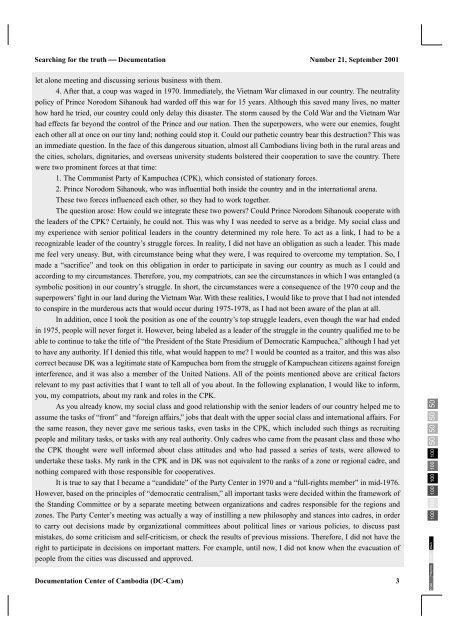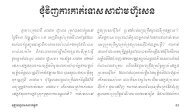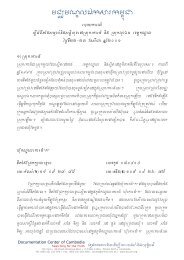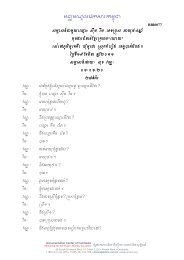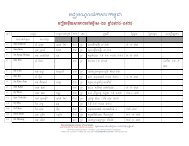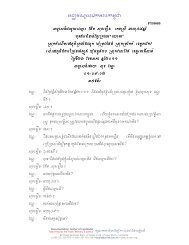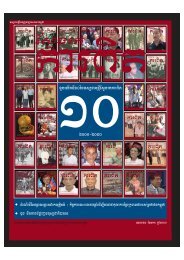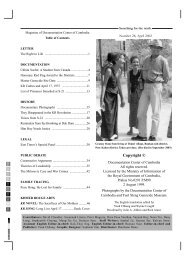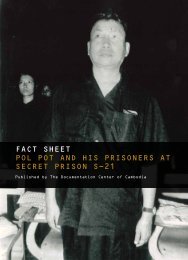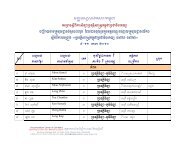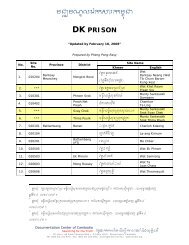Searching for the truth Issues 21 - Documentation Center of Cambodia
Searching for the truth Issues 21 - Documentation Center of Cambodia
Searching for the truth Issues 21 - Documentation Center of Cambodia
You also want an ePaper? Increase the reach of your titles
YUMPU automatically turns print PDFs into web optimized ePapers that Google loves.
<strong>Searching</strong> <strong>for</strong> <strong>the</strong> <strong>truth</strong> ⎯ <strong>Documentation</strong><br />
Number <strong>21</strong>, September 2001<br />
let alone meeting and discussing serious business with <strong>the</strong>m.<br />
4. After that, a coup was waged in 1970. Immediately, <strong>the</strong> Vietnam War climaxed in our country. The neutrality<br />
policy <strong>of</strong> Prince Norodom Sihanouk had warded <strong>of</strong>f this war <strong>for</strong> 15 years. Although this saved many lives, no matter<br />
how hard he tried, our country could only delay this disaster. The storm caused by <strong>the</strong> Cold War and <strong>the</strong> Vietnam War<br />
had effects far beyond <strong>the</strong> control <strong>of</strong> <strong>the</strong> Prince and our nation. Then <strong>the</strong> superpowers, who were our enemies, fought<br />
each o<strong>the</strong>r all at once on our tiny land; nothing could stop it. Could our pa<strong>the</strong>tic country bear this destruction? This was<br />
an immediate question. In <strong>the</strong> face <strong>of</strong> this dangerous situation, almost all <strong>Cambodia</strong>ns living both in <strong>the</strong> rural areas and<br />
<strong>the</strong> cities, scholars, dignitaries, and overseas university students bolstered <strong>the</strong>ir cooperation to save <strong>the</strong> country. There<br />
were two prominent <strong>for</strong>ces at that time:<br />
1. The Communist Party <strong>of</strong> Kampuchea (CPK), which consisted <strong>of</strong> stationary <strong>for</strong>ces.<br />
2. Prince Norodom Sihanouk, who was influential both inside <strong>the</strong> country and in <strong>the</strong> international arena.<br />
These two <strong>for</strong>ces influenced each o<strong>the</strong>r, so <strong>the</strong>y had to work toge<strong>the</strong>r.<br />
The question arose: How could we integrate <strong>the</strong>se two powers? Could Prince Norodom Sihanouk cooperate with<br />
<strong>the</strong> leaders <strong>of</strong> <strong>the</strong> CPK? Certainly, he could not. This was why I was needed to serve as a bridge. My social class and<br />
my experience with senior political leaders in <strong>the</strong> country determined my role here. To act as a link, I had to be a<br />
recognizable leader <strong>of</strong> <strong>the</strong> country’s struggle <strong>for</strong>ces. In reality, I did not have an obligation as such a leader. This made<br />
me feel very uneasy. But, with circumstance being what <strong>the</strong>y were, I was required to overcome my temptation. So, I<br />
made a “sacrifice” and took on this obligation in order to participate in saving our country as much as I could and<br />
according to my circumstances. There<strong>for</strong>e, you, my compatriots, can see <strong>the</strong> circumstances in which I was entangled (a<br />
symbolic position) in our country’s struggle. In short, <strong>the</strong> circumstances were a consequence <strong>of</strong> <strong>the</strong> 1970 coup and <strong>the</strong><br />
superpowers’ fight in our land during <strong>the</strong> Vietnam War. With <strong>the</strong>se realities, I would like to prove that I had not intended<br />
to conspire in <strong>the</strong> murderous acts that would occur during 1975-1978, as I had not been aware <strong>of</strong> <strong>the</strong> plan at all.<br />
In addition, once I took <strong>the</strong> position as one <strong>of</strong> <strong>the</strong> country’s top struggle leaders, even though <strong>the</strong> war had ended<br />
in 1975, people will never <strong>for</strong>get it. However, being labeled as a leader <strong>of</strong> <strong>the</strong> struggle in <strong>the</strong> country qualified me to be<br />
able to continue to take <strong>the</strong> title <strong>of</strong> “<strong>the</strong> President <strong>of</strong> <strong>the</strong> State Presidium <strong>of</strong> Democratic Kampuchea,” although I had yet<br />
to have any authority. If I denied this title, what would happen to me? I would be counted as a traitor, and this was also<br />
correct because DK was a legitimate state <strong>of</strong> Kampuchea born from <strong>the</strong> struggle <strong>of</strong> Kampuchean citizens against <strong>for</strong>eign<br />
interference, and it was also a member <strong>of</strong> <strong>the</strong> United Nations. All <strong>of</strong> <strong>the</strong> points mentioned above are critical factors<br />
relevant to my past activities that I want to tell all <strong>of</strong> you about. In <strong>the</strong> following explanation, I would like to in<strong>for</strong>m,<br />
you, my compatriots, about my rank and roles in <strong>the</strong> CPK.<br />
As you already know, my social class and good relationship with <strong>the</strong> senior leaders <strong>of</strong> our country helped me to<br />
assume <strong>the</strong> tasks <strong>of</strong> “front” and “<strong>for</strong>eign affairs,” jobs that dealt with <strong>the</strong> upper social class and international affairs. For<br />
<strong>the</strong> same reason, <strong>the</strong>y never gave me serious tasks, even tasks in <strong>the</strong> CPK, which included such things as recruiting<br />
people and military tasks, or tasks with any real authority. Only cadres who came from <strong>the</strong> peasant class and those who<br />
<strong>the</strong> CPK thought were well in<strong>for</strong>med about class attitudes and who had passed a series <strong>of</strong> tests, were allowed to<br />
undertake <strong>the</strong>se tasks. My rank in <strong>the</strong> CPK and in DK was not equivalent to <strong>the</strong> ranks <strong>of</strong> a zone or regional cadre, and<br />
nothing compared with those responsible <strong>for</strong> cooperatives.<br />
It is true to say that I became a “candidate” <strong>of</strong> <strong>the</strong> Party <strong>Center</strong> in 1970 and a “full-rights member” in mid-1976.<br />
However, based on <strong>the</strong> principles <strong>of</strong> “democratic centralism,” all important tasks were decided within <strong>the</strong> framework <strong>of</strong><br />
<strong>the</strong> Standing Committee or by a separate meeting between organizations and cadres responsible <strong>for</strong> <strong>the</strong> regions and<br />
zones. The Party <strong>Center</strong>’s meeting was actually a way <strong>of</strong> instilling a new philosophy and stances into cadres, in order<br />
to carry out decisions made by organizational committees about political lines or various policies, to discuss past<br />
mistakes, do some criticism and self-criticism, or check <strong>the</strong> results <strong>of</strong> previous missions. There<strong>for</strong>e, I did not have <strong>the</strong><br />
right to participate in decisions on important matters. For example, until now, I did not know when <strong>the</strong> evacuation <strong>of</strong><br />
people from <strong>the</strong> cities was discussed and approved.<br />
<strong>Documentation</strong> <strong>Center</strong> <strong>of</strong> <strong>Cambodia</strong> (DC-Cam) 3<br />
100 100 100 100 100 100 50 50 50 50<br />
Black<br />
Yellow<br />
Magenta<br />
Cyan


